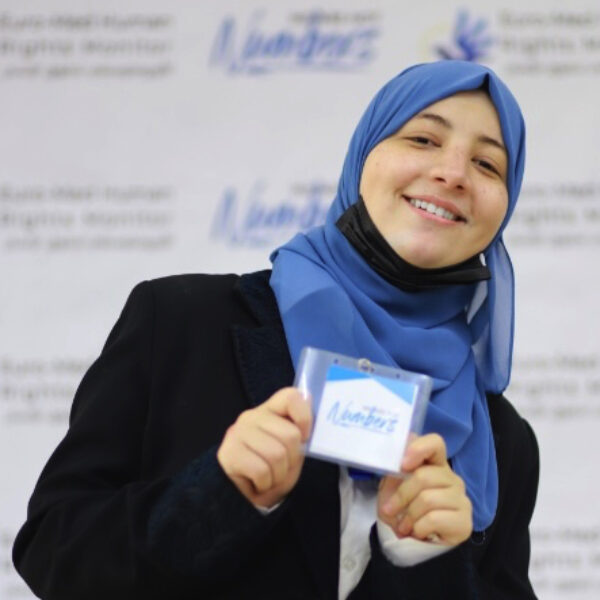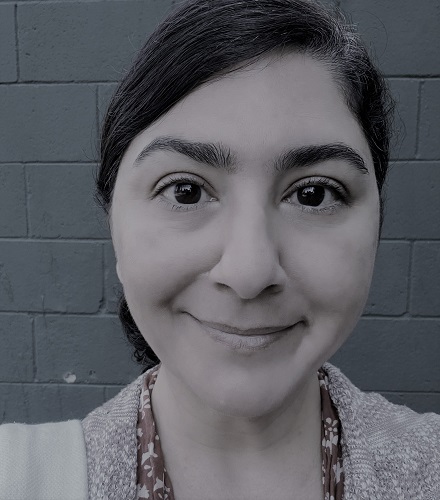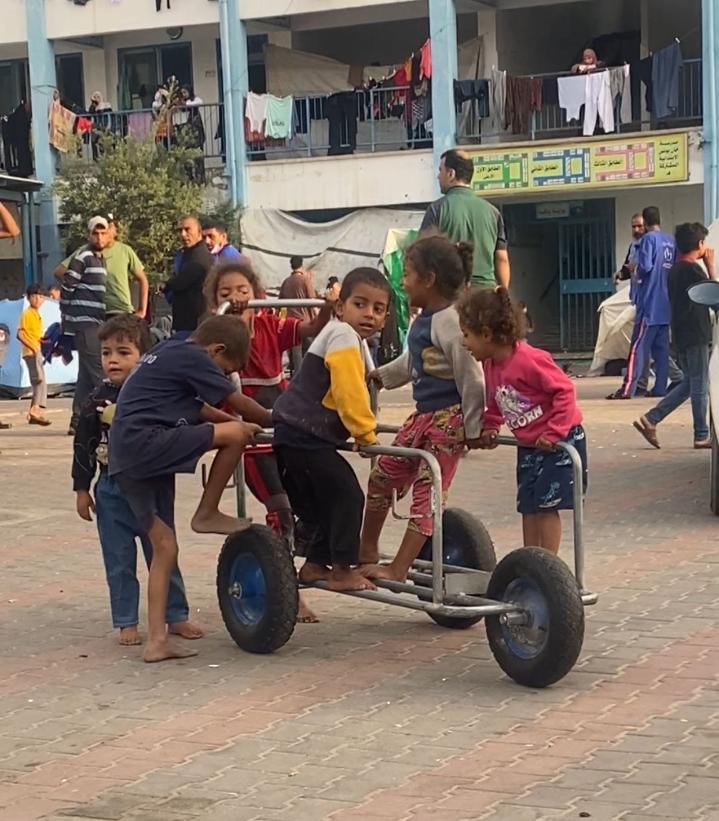
Sunday, Oct. 22, 2023. The calendar marked the 15th day of war. Eleven agonizing days have passed. We find ourselves displaced, seeking refuge in the modest home of Abu Islam, a friend of my grandfather’s, in the rural community of Qizan Abu Rashwan. Abu Islam’s family of ten, my grandfather’s family of six (my grandfather and grandmother, two uncles, an aunt, and a 1-year-old), and my own family of seven (my parents and five children) huddle together in fear. Twenty-three souls bound together by uncertainty.
Abu Islam and his family have generously offered my grandfather’s and my family two interconnected rooms in their home, one being an office filled with books. We have improvised, attempting to divide the space to accommodate all 13 of us. We settle on thin 1-inch mattresses laid on the ground, and navigate each day with dwindling resources of food, water, and no electricity.
Rewind to Oct. 7
Just 16 days earlier, on Oct. 7, I had awakened at 6:00 a.m., hastily preparing to catch the bus to attend classes at Al-Azhar University. But on that fateful morning, just steps from my door, the sky erupted with the thunderous roar of aircraft missiles. In that moment, my hard work for a brighter future was annihilated. My visions of freedom turned into turmoil, betrayal, and the abrupt loss of normalcy.
My university was one of the first to be targeted by the missiles (now, every university in Gaza is gone).
Wake up – Evacuate!
On Oct. 9, the war unleashed its fury upon my close-knit community in Abassan, located in the Khan Younis Governorate. My town was once a calm haven. Yet, on Day 3 of the war, it became a place marred by suffering and destruction. Windows shattered and roofs collapsed during six agonizing hours of relentless bombing. To me, each strike signaled annihilation. We evacuated at 5:30 a.m. during a tense lull in the bombing. My father urged us forward, despite our terror. Exhausted, we trudged through streets dotted with fires and jammed with shrapnel. Despair weighed heavily, yet we continued until we reached Abu Islam’s home.
Once we arrived, I tried to follow my normal nightly routine for sleep. While my siblings tucked into bed, I lingered a bit longer, taking advantage of the surprisingly stable internet connection.
But at 10 p.m., the familiar sounds of gunfire and buzzing drones filled the air, reminding me that I’m never safe in this forever war. My uncle’s one-year-old daughter Lana cried, adding to the tension. Feeling weary, I drifted off to sleep, seeking solace from the unsettling atmosphere. I wondered, will I ever grow accustomed to this brutal violence?
Two hours later, I was startled awake by frantic voices and panicked children who were half awake. It seemed like morning, but it was only midnight. The lights in the neighbor’s building flickered on, casting their glow through our window. It was a rare sight in the darkness when most people refrained from turning on their lights, fearing they might become targets for missiles. Confused and disoriented, I sensed that something was amiss.
Abu Islam’s panicked voice boomed as he shouted to his neighbors, “What’s going on?” Feeling a surge of worry, I instinctively slipped on my socks. Within moments, a member of Abu Islam’s family pounded on our door, urgently shouting, “Wake up — evacuate!”
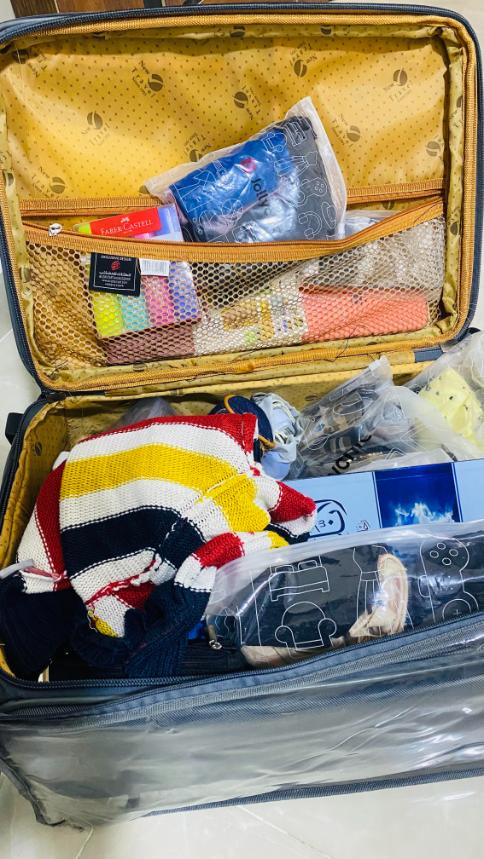
We hastily put on our shoes and grabbed bags as we rushed outside. In Gaza, it’s common to keep an emergency bag stocked with spare clothes, medications, and first aid supplies. We are forever prepared for war and displacement. Every night since this war began, I make sure that my bag is close, just in case.
My uncle scooped up Lana and urged his wife to leave everything. She followed him and we hurried out into the night.
Israeli forces had issued a “warning” to evacuate the neighboring building minutes before they would bomb it.
Exodus – No safe place
Stepping outside, I was absorbed into a throng of evacuees: locals, newcomers from the North, children, women, and the elderly, all streaming out in a desperate exodus. Abu Islam’s family, fortunate to have a car, piled in and drove off. Meanwhile, my family, alongside my grandfather’s, navigated the chaos on foot. In the rush, my uncle realized he’d left his phone behind and dashed back, only to find the doors locked tight.
We walked aimlessly, searching for a safe refuge, yet knowing that one did not exist. Grandpa suggested schools, but we hesitated; they were crowded, far away, and exposed to the danger of airstrikes.
After walking for an hour, we found an empty house and took shelter outside. Later, a car picked up another family sheltering in the same location, but it had no room for Grandpa’s family or mine. It was 1 a.m. Lana’s cries pierced the night, but amidst the chaos, her distress was a minor concern compared to our larger worries.
My uncle’s wife, overwhelmed with fear, began knocking on doors and shouting. The driver returned, and had room for my grandfather’s family. They urged my little brother to join them, but my mom insisted on our family staying together.
After they left, the street fell eerily quiet. Strangely, I sensed comfort in the calm. Dad’s attempts at humor eased the atmosphere. My younger brother urgently needed to use the bathroom. Twenty anxious minutes passed, and still, the car hadn’t returned. I feared we were abandoned.
Thankfully, the driver returned, impressing us with his bravery. All seven of us crammed into the car, heading to the UNWRA school where the others had gone, except for my uncle and his wife, who had gone to shelter with his in-laws.
2:00 a.m.: Exiting the car, the disarray was striking, with garbage strewn about and donkey carts cluttering the streets. The UNWRA school, our temporary refuge, had no space for us inside. We gathered beside the school gate instead.
As we settled on the sidewalk, my twin sister, Raghd, and I perched on a stiff school desk. Grandma lay on the ground with uncle and my younger sisters beside her. Mom abandoned her chair for the ground, finding it more bearable. Dad found a spot among strangers and laid down beside them.
When my little sister Rand urgently needed the bathroom, I escorted her across the crowded school grounds, where people lay motionless, creating an eerie scene. The stench near the bathroom was overwhelming. Holding my breath, I waited with the flashlight until she finished.
Returning to our family, I saw exhaustion on everyone’s faces. I noticed people smoking and looking unwell. Some leaned against walls, while others sat hunched over quietly sobbing. Worried frowns and tense jaws spoke volumes of the collective exhaustion. The scene felt like a pandemic, spreading a contagious virus of despair and uncertainty.
At 5:00 a.m., Dad woke up and wandered around. I spotted a couple of women carrying empty gallon jugs and inquired about nearby water and bathrooms. The closest was in the maternity department at Nasser Hospital.
Nasser Hospital
As I approached the hospital, the sidewalks teemed with people. People lay scattered; some gathered in small groups, while others sat alone. Cars filled the streets, mostly occupied by men, their faces etched with fatigue. The area was bustling with journalist crews with cameras, ready to capture any ambulance arrival. I witnessed an ambulance approach. The medical team carried shrouded bodies stained in blood, individuals with severe wounds, and dusty, wounded children, tears streaming down their faces. It was heart wrenching.
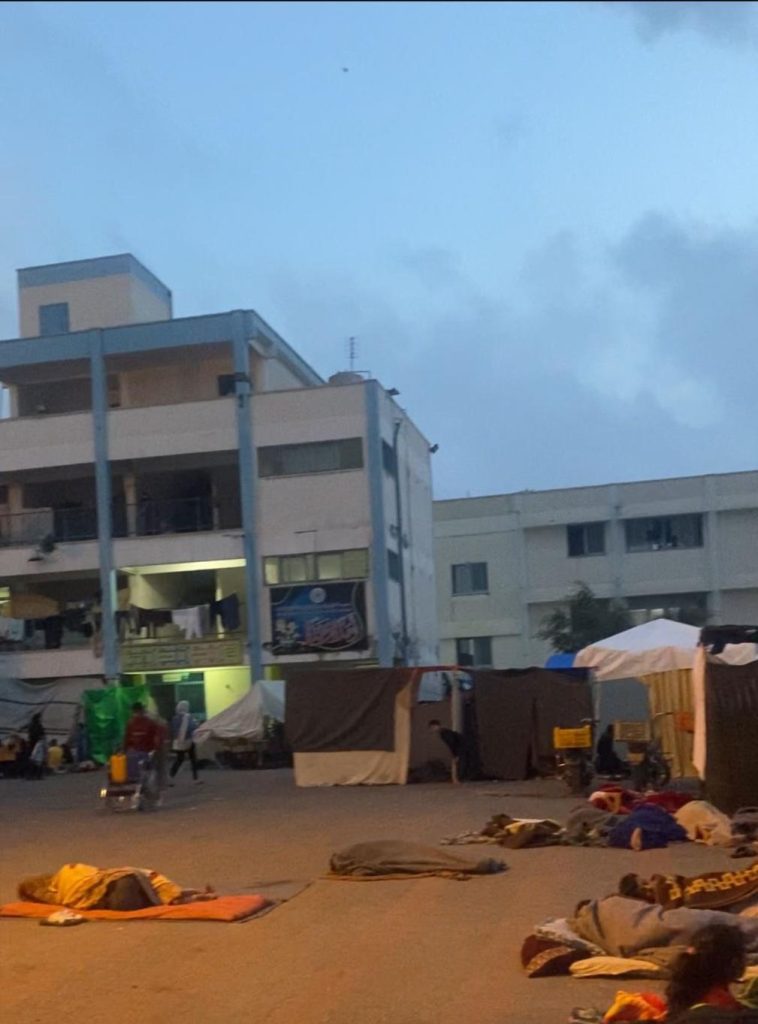
I reached the hospital and found the lobby packed with people sleeping on the floor. A nurse directed me to a door on the right, which led to a waiting area filled with woman and children with bedsheets and pillows, sleeping on chairs or the floor.
Two girls stood in front of the bathroom door, so I waited behind them, hoping for access to water and a clean bathroom. When one of the girls entered, the Fajr Athan (morning prayer) started, and I moved closer to the door.
It quickly became very crowded by the bathroom, and the line turned into a chaotic mass. Tensions rose as some women behind me started to argue about who should go next. I quietly reminded them we should support each other. They fell silent. After quickly using the bathroom, I barely made it out as women on the other side of the door pushed to enter.
After returning, I prayed Fajr, my heart heavy with the suffering around me. I wanted everything to just end.
As the sun rose, the schoolyard was illuminated with colorful laundry hanging from the windows. I snapped photos while kids played with donkey carts. My brother found his classmates. Meanwhile, my family searched for bread and basic supplies.
Back to Abu Islam’s
After this agonizing evacuation, we learned that the military had not bombed Abu Islam’s neighborhood. We prepared to return to his home.
We flagged down a car to take us back and arrived at 9 a.m. In my haste, I fell in the street, hurting my wrist. I washed my abaya, hung it to dry and found everyone getting ready to sleep. Exhausted, I joined them.
Waking up at 11:00 a.m., I heard noises in the living room and joined my family. Sitting there, I pondered our uncertain future. With schools destroyed throughout Gaza, I wondered what would happen to my education, my family, and my life.
My father called to check on family and I felt drained of all spirit. My grandma prepared lunch — rice with canned mushrooms. Though I lacked an appetite, I ate, picking out the mushrooms for my father who didn’t mind them. My stomach churned.
Later I prepared for bed, and made sure my bag was packed and close to me: chargers, phone, and flashlights, check!
I recited my Athkar prayers before falling asleep: May the misery end, may we return to our homes, may we remain safe, may happiness return, may the martyrs and wounded find peace and healing, and may we see freedom.

